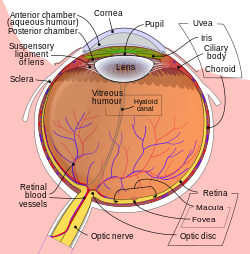Intraocular hemorrhage

Editor-In-Chief: Prab R Tumpati, MD
Obesity, Sleep & Internal medicine
Founder, WikiMD Wellnesspedia &
W8MD's medical weight loss NYC, sleep center NYC
Philadelphia medical weight loss and Philadelphia sleep clinics
| Intraocular hemorrhage | |
|---|---|

| |
| Synonyms | Intraocular bleeding |
| Pronounce | N/A |
| Specialty | N/A |
| Symptoms | Vision loss, floaters, photophobia |
| Complications | Glaucoma, retinal detachment |
| Onset | Sudden |
| Duration | Varies |
| Types | N/A |
| Causes | Trauma, diabetic retinopathy, retinal vein occlusion, age-related macular degeneration |
| Risks | Diabetes mellitus, hypertension, blood clotting disorders |
| Diagnosis | Ophthalmoscopy, ultrasound, fluorescein angiography |
| Differential diagnosis | Retinal detachment, vitreous hemorrhage, uveitis |
| Prevention | N/A |
| Treatment | Observation, vitrectomy, laser photocoagulation |
| Medication | N/A |
| Prognosis | Depends on cause and severity |
| Frequency | Common in diabetic retinopathy |
| Deaths | N/A |
Intraocular Hemorrhage is a medical condition characterized by bleeding within the eye. It can occur in various parts of the eye, including the retina, vitreous humor, and anterior chamber. This condition can lead to serious complications, such as glaucoma, retinal detachment, and vision loss.
Causes[edit]
Intraocular hemorrhage can be caused by a variety of factors. These include trauma to the eye, blood clotting disorders, high blood pressure, and certain eye diseases such as diabetic retinopathy and macular degeneration. In some cases, the cause of the hemorrhage may not be identifiable.
Symptoms[edit]
The symptoms of intraocular hemorrhage can vary depending on the location and severity of the bleeding. Common symptoms include sudden vision loss, floaters, blurred vision, and eye pain. In some cases, the hemorrhage may not cause any noticeable symptoms.
Diagnosis[edit]
The diagnosis of intraocular hemorrhage is typically made through a comprehensive eye examination. This may include a visual acuity test, a dilated eye exam, and imaging tests such as optical coherence tomography (OCT) and ultrasound of the eye.
Treatment[edit]
The treatment for intraocular hemorrhage depends on the cause and severity of the bleeding. Treatment options may include medication, laser therapy, vitrectomy (surgery to remove the vitreous humor), and cryotherapy (freezing treatment). In some cases, no treatment may be necessary, and the hemorrhage will resolve on its own.
Prognosis[edit]
The prognosis for intraocular hemorrhage depends on the underlying cause and the extent of the bleeding. With prompt diagnosis and treatment, many people can maintain good vision. However, in severe cases, the condition can lead to permanent vision loss.
See Also[edit]
Ad. Transform your life with W8MD's Budget GLP-1 injections from $49.99


W8MD offers a medical weight loss program to lose weight in Philadelphia. Our physician-supervised medical weight loss provides:
- Weight loss injections in NYC (generic and brand names):
- Zepbound / Mounjaro, Wegovy / Ozempic, Saxenda
- Most insurances accepted or discounted self-pay rates. We will obtain insurance prior authorizations if needed.
- Generic GLP1 weight loss injections from $49.99 for the starting dose of Semaglutide and $65.00 for Tirzepatide.
- Also offer prescription weight loss medications including Phentermine, Qsymia, Diethylpropion, Contrave etc.
NYC weight loss doctor appointmentsNYC weight loss doctor appointments
Start your NYC weight loss journey today at our NYC medical weight loss and Philadelphia medical weight loss clinics.
- Call 718-946-5500 to lose weight in NYC or for medical weight loss in Philadelphia 215-676-2334.
- Tags:NYC medical weight loss, Philadelphia lose weight Zepbound NYC, Budget GLP1 weight loss injections, Wegovy Philadelphia, Wegovy NYC, Philadelphia medical weight loss, Brookly weight loss and Wegovy NYC
|
WikiMD's Wellness Encyclopedia |
| Let Food Be Thy Medicine Medicine Thy Food - Hippocrates |
Medical Disclaimer: WikiMD is not a substitute for professional medical advice. The information on WikiMD is provided as an information resource only, may be incorrect, outdated or misleading, and is not to be used or relied on for any diagnostic or treatment purposes. Please consult your health care provider before making any healthcare decisions or for guidance about a specific medical condition. WikiMD expressly disclaims responsibility, and shall have no liability, for any damages, loss, injury, or liability whatsoever suffered as a result of your reliance on the information contained in this site. By visiting this site you agree to the foregoing terms and conditions, which may from time to time be changed or supplemented by WikiMD. If you do not agree to the foregoing terms and conditions, you should not enter or use this site. See full disclaimer.
Credits:Most images are courtesy of Wikimedia commons, and templates, categories Wikipedia, licensed under CC BY SA or similar.
Translate this page: - East Asian
中文,
日本,
한국어,
South Asian
हिन्दी,
தமிழ்,
తెలుగు,
Urdu,
ಕನ್ನಡ,
Southeast Asian
Indonesian,
Vietnamese,
Thai,
မြန်မာဘာသာ,
বাংলা
European
español,
Deutsch,
français,
Greek,
português do Brasil,
polski,
română,
русский,
Nederlands,
norsk,
svenska,
suomi,
Italian
Middle Eastern & African
عربى,
Turkish,
Persian,
Hebrew,
Afrikaans,
isiZulu,
Kiswahili,
Other
Bulgarian,
Hungarian,
Czech,
Swedish,
മലയാളം,
मराठी,
ਪੰਜਾਬੀ,
ગુજરાતી,
Portuguese,
Ukrainian


